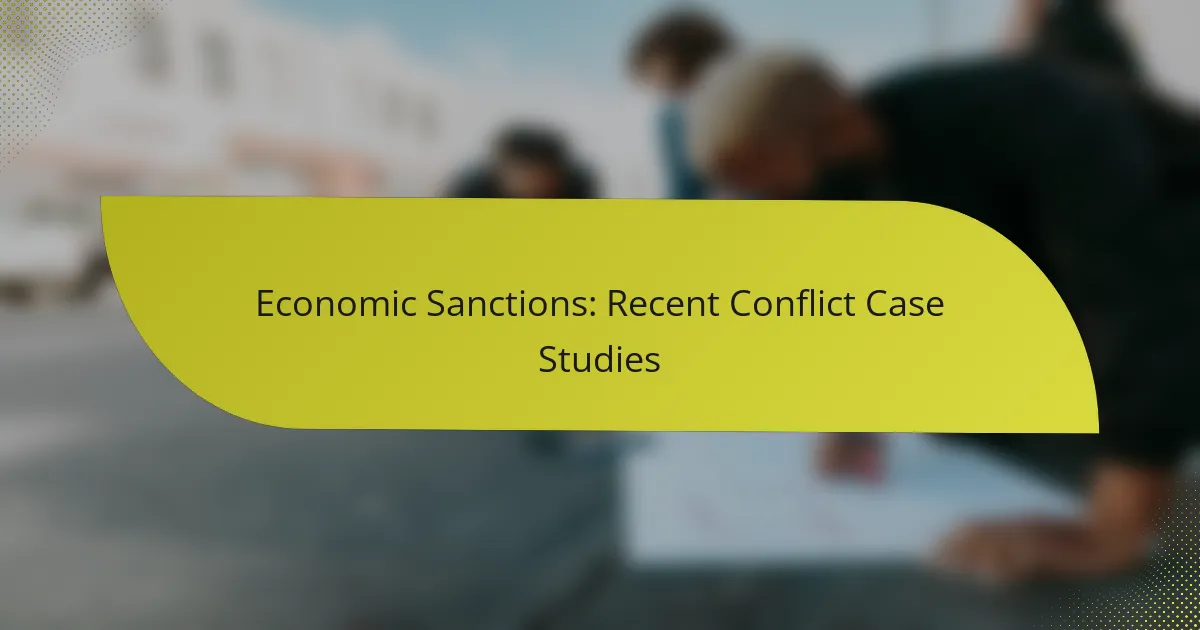Economic sanctions serve as a critical tool for nations and international organizations aiming to alter the behavior of targeted countries. By imposing trade restrictions, asset freezes, and financial penalties, these measures can lead to significant economic consequences, including reduced GDP and increased social unrest. This analysis explores recent conflict case studies to evaluate the effectiveness of sanctions in achieving their intended political and economic objectives.
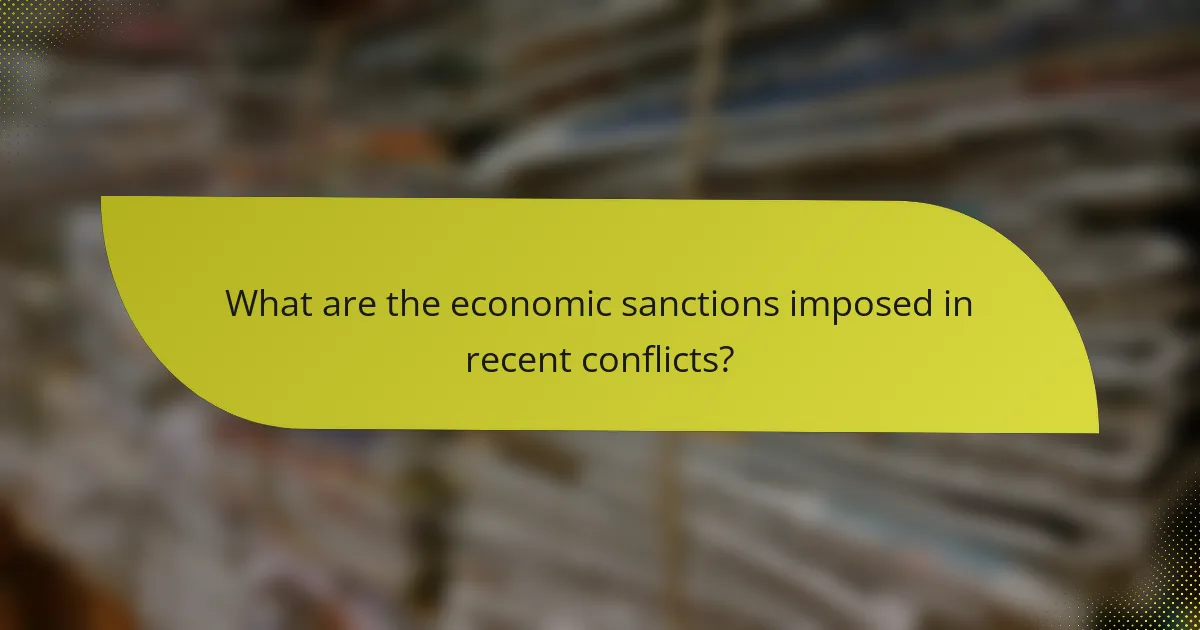
What are the economic sanctions imposed in recent conflicts?
Economic sanctions are restrictive measures imposed by countries or international organizations to influence the behavior of a target nation. These sanctions can include trade restrictions, asset freezes, and financial penalties aimed at compelling compliance with international laws or norms.
Sanctions against Russia during the Ukraine conflict
In response to Russia’s annexation of Crimea and its involvement in the Ukraine conflict, numerous countries, particularly in the West, imposed extensive economic sanctions. These measures targeted key sectors such as finance, energy, and defense, aiming to weaken Russia’s economy and limit its military capabilities.
Sanctions included restrictions on access to international financial markets and bans on the export of certain technologies. For example, major Russian banks faced limitations on their ability to raise capital in Western markets, significantly impacting their operations.
Sanctions on Iran due to nuclear program
Iran has faced a series of economic sanctions primarily due to concerns over its nuclear program. These sanctions, imposed by the United States and other nations, have targeted Iran’s oil exports, banking sector, and access to international trade.
The sanctions have led to a substantial decrease in Iran’s oil revenues, which are crucial for its economy. In recent years, the country has struggled with inflation and currency devaluation, largely attributed to these restrictive measures.
Sanctions targeting North Korea for missile tests
North Korea has been subjected to stringent economic sanctions in response to its ongoing missile tests and nuclear weapons development. The United Nations and various countries have implemented measures that restrict trade, particularly in coal, textiles, and seafood, which are vital to the North Korean economy.
These sanctions aim to pressure the regime into denuclearization talks. However, the effectiveness of these sanctions is often debated, as North Korea has continued its missile testing despite international pressure.
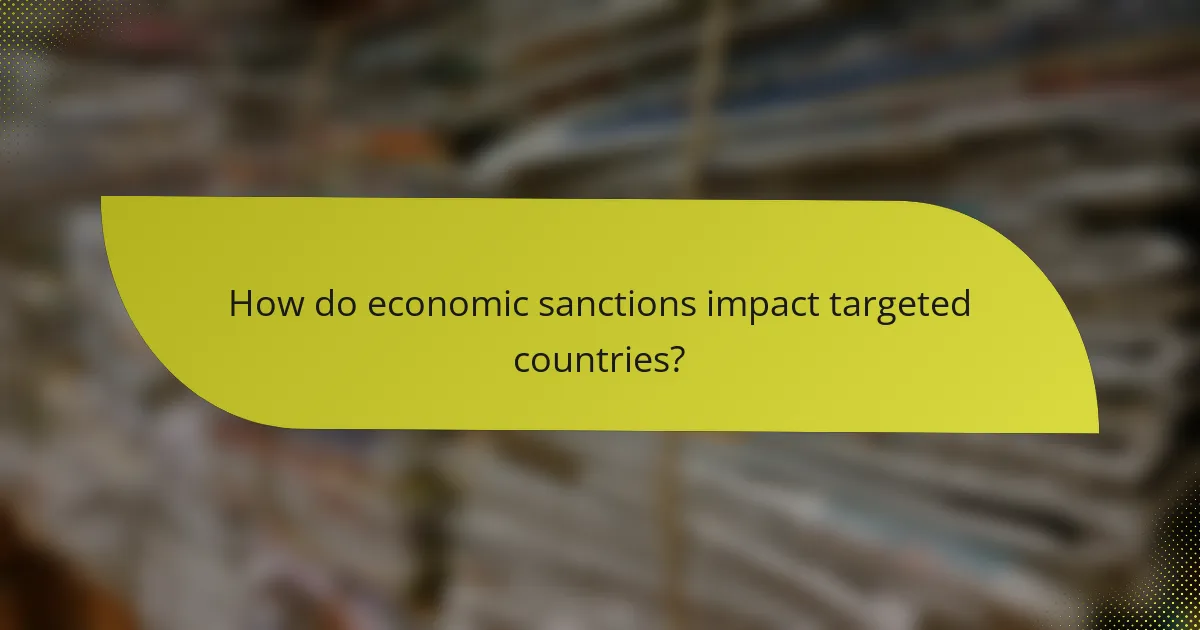
How do economic sanctions impact targeted countries?
Economic sanctions significantly affect targeted countries by restricting trade, financial transactions, and access to resources. These measures can lead to severe economic consequences, including reduced GDP, increased inflation, and heightened social unrest.
Economic downturn and inflation
Economic sanctions often trigger a downturn by limiting exports and imports, which can lead to job losses and decreased consumer spending. Countries may experience inflation as a result of reduced supply of goods, causing prices to rise significantly, sometimes by double-digit percentages.
For instance, in countries facing extensive sanctions, basic commodities like food and fuel may see sharp price increases, straining household budgets. This inflation can disproportionately affect lower-income populations, leading to greater inequality and social tension.
Humanitarian crises and public health issues
Sanctions can exacerbate humanitarian crises by restricting access to essential goods, including food, medicine, and medical supplies. This can lead to increased malnutrition rates and deteriorating health conditions, particularly among vulnerable populations such as children and the elderly.
Public health systems may collapse under the pressure of sanctions, as hospitals struggle to obtain necessary equipment and medications. For example, sanctions on countries like Venezuela have resulted in significant shortages of critical healthcare resources, leading to outbreaks of preventable diseases and increased mortality rates.
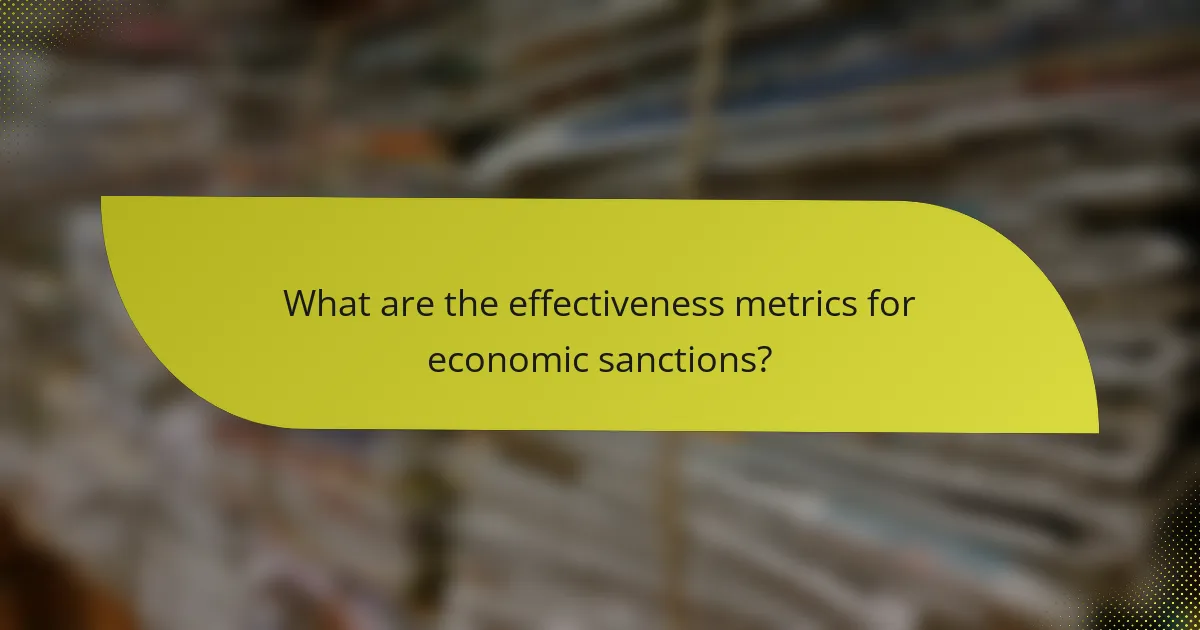
What are the effectiveness metrics for economic sanctions?
The effectiveness of economic sanctions can be measured through various metrics, primarily focusing on changes in government behavior and shifts in economic indicators. These metrics help assess whether sanctions achieve their intended political or economic objectives.
Changes in government behavior
One key metric for evaluating economic sanctions is the observable changes in the targeted government’s actions or policies. For instance, if sanctions lead to a reduction in aggressive military activities or a willingness to negotiate, they can be deemed effective. However, the impact often varies based on the resilience of the regime and the level of international support.
Governments may respond to sanctions by altering their foreign policies, engaging in diplomacy, or even doubling down on their current strategies. Understanding these behavioral shifts is crucial for assessing the overall success of sanctions.
Economic indicators and trade volume
Economic indicators, such as GDP growth, inflation rates, and trade volumes, serve as critical metrics for measuring the impact of sanctions. A significant decline in trade volume with sanctioning countries often indicates the sanctions are having an effect. For example, a country facing sanctions may see its exports drop by tens of percent, reflecting the sanctions’ economic pressure.
Monitoring changes in economic indicators can provide insights into the sanctions’ effectiveness. Analysts often look for trends over time, such as prolonged recession or increased inflation, to gauge the broader economic impact on the targeted nation. This data can inform future policy decisions regarding sanctions and their potential adjustments.
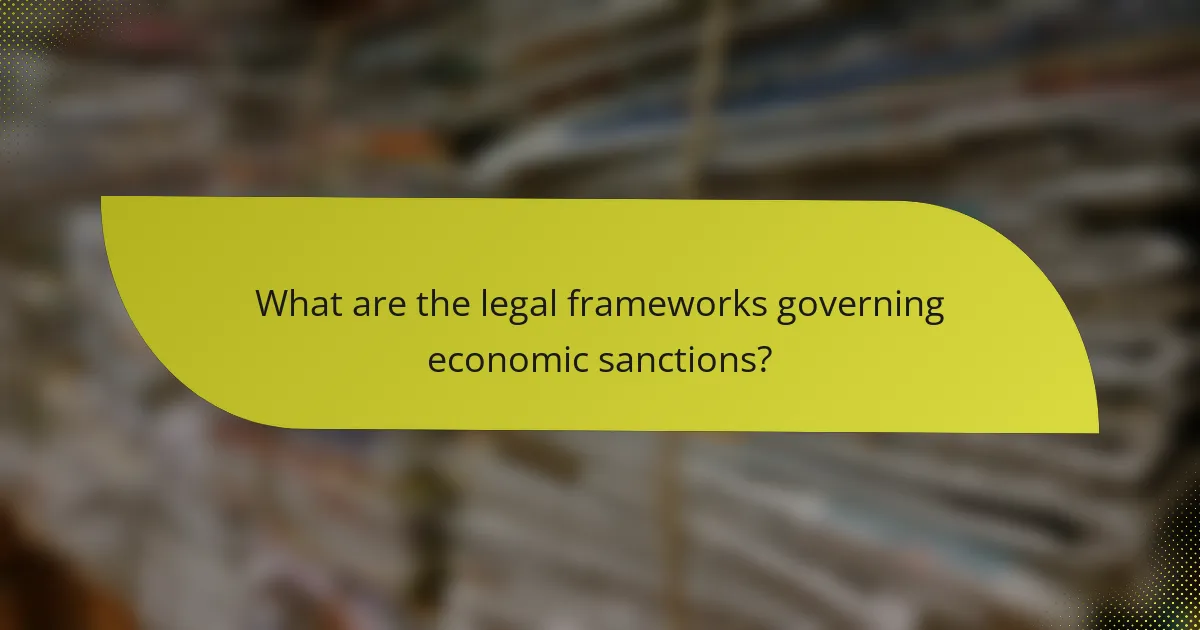
What are the legal frameworks governing economic sanctions?
The legal frameworks governing economic sanctions consist of international laws and national regulations that dictate how and when sanctions can be imposed. These frameworks aim to achieve foreign policy objectives while ensuring compliance with legal standards and protecting human rights.
United Nations sanctions regulations
The United Nations (UN) imposes sanctions through Security Council resolutions, which are binding on all member states. These sanctions can include asset freezes, trade restrictions, and travel bans aimed at specific individuals or entities associated with threats to international peace and security.
UN sanctions are typically implemented in response to issues like terrorism, nuclear proliferation, or violations of international law. Member states must ensure that their national laws align with these regulations, which may involve enacting specific legislation or modifying existing laws to comply with UN mandates.
U.S. Office of Foreign Assets Control guidelines
The U.S. Office of Foreign Assets Control (OFAC) administers and enforces economic sanctions based on U.S. foreign policy and national security goals. OFAC regulations can prohibit transactions with designated countries, individuals, and entities, and often require U.S. persons to block or report such transactions.
OFAC guidelines are extensive and can vary significantly depending on the specific sanctions program. Businesses and individuals must conduct thorough due diligence to ensure compliance, including checking the Specially Designated Nationals and Blocked Persons List (SDN List) regularly to avoid penalties.
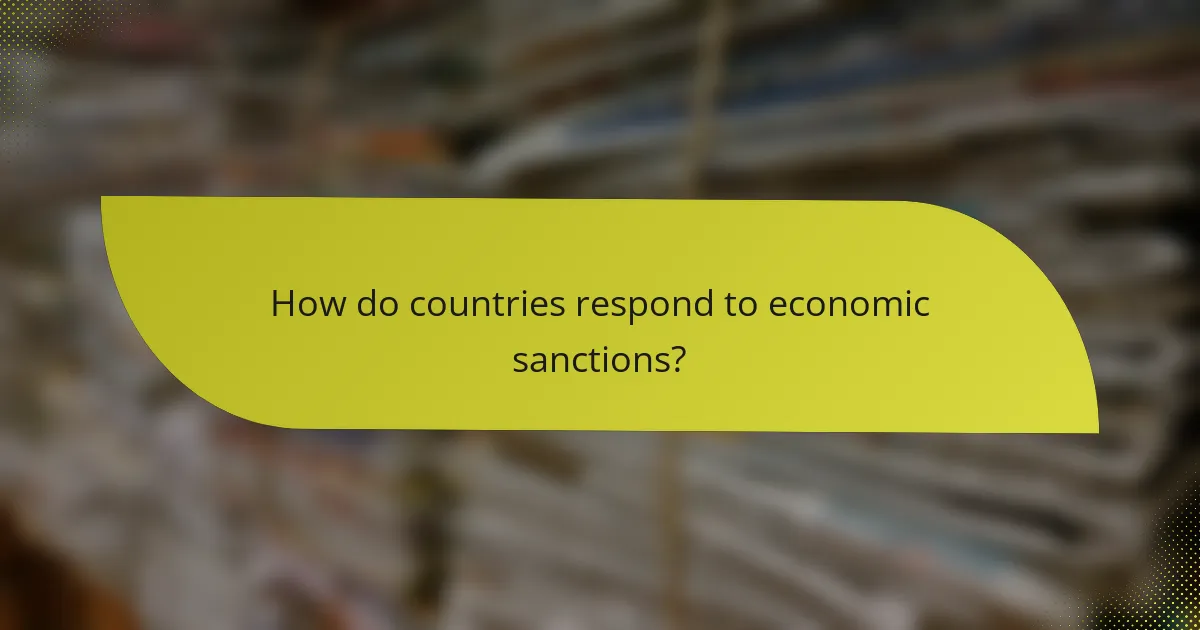
How do countries respond to economic sanctions?
Countries typically respond to economic sanctions through a combination of diplomatic efforts, trade adjustments, and sometimes retaliatory measures. These responses aim to mitigate the impact of sanctions while seeking to restore normal relations or assert national interests.
Diplomatic negotiations and counter-sanctions
Diplomatic negotiations are a primary response to economic sanctions, as countries may seek to engage in dialogue to resolve underlying issues. This can involve direct talks or mediation through international organizations to find common ground.
In some cases, countries may implement counter-sanctions as a form of retaliation. For example, if one country imposes trade restrictions, the affected nation might target exports from the sanctioning country, creating a cycle of economic tension.
Shifts in trade partnerships
Countries facing economic sanctions often seek to diversify their trade partnerships to reduce reliance on sanctioned economies. This can involve forming new alliances or strengthening existing ties with nations that are not participating in the sanctions.
For instance, a country under sanctions may pivot towards emerging markets or regional partners, potentially leading to increased trade with countries in Asia or Africa. This shift can help stabilize their economy but may also lead to higher costs or reduced quality of goods and services.
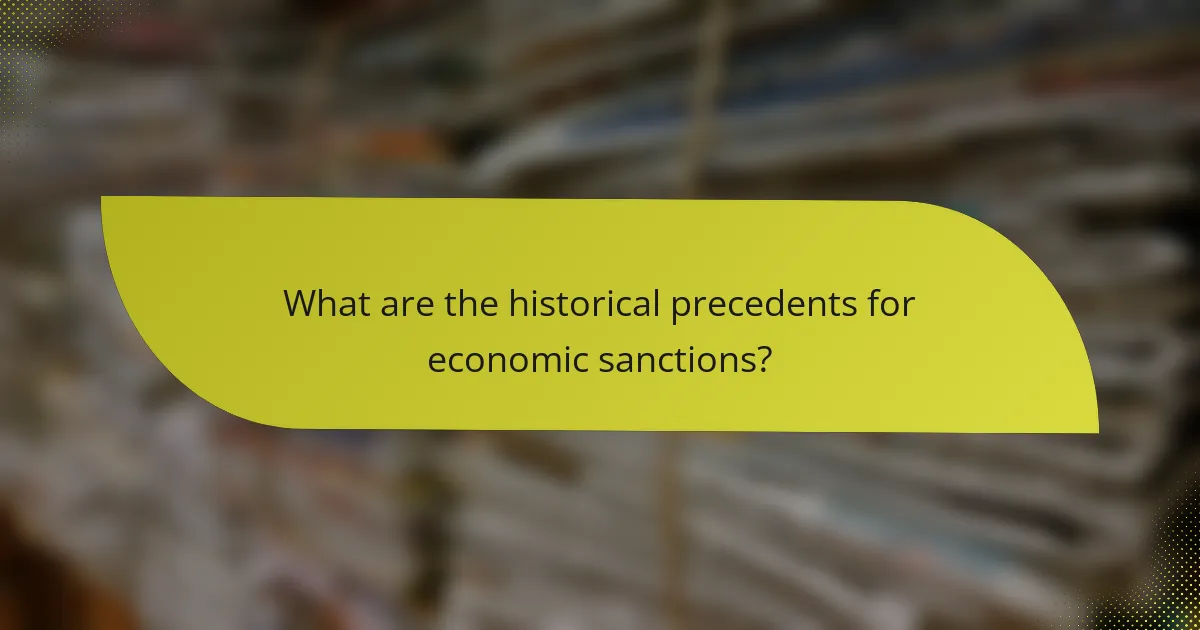
What are the historical precedents for economic sanctions?
Economic sanctions have been used throughout history as tools of foreign policy to influence nations’ behaviors without resorting to military action. They typically involve restrictions on trade, financial transactions, or other economic activities aimed at achieving political objectives.
Sanctions during the Gulf War
During the Gulf War in the early 1990s, the United Nations imposed comprehensive economic sanctions on Iraq following its invasion of Kuwait. These sanctions aimed to pressure Iraq into withdrawing its forces and complying with international law.
The sanctions included trade embargoes on oil, which significantly impacted Iraq’s economy, leading to shortages of essential goods and humanitarian crises. The effectiveness of these sanctions was debated, as they did not immediately lead to Iraq’s withdrawal but contributed to long-term economic instability.
South Africa’s apartheid-era sanctions
In the 1980s, a global movement led to economic sanctions against South Africa in response to its apartheid policies. These sanctions included trade restrictions, divestment from South African companies, and bans on cultural and sports exchanges.
The sanctions aimed to isolate the South African government and pressure it to dismantle apartheid. While their immediate impact on policy change was unclear, they played a significant role in raising international awareness and contributing to the eventual end of apartheid in the early 1990s.
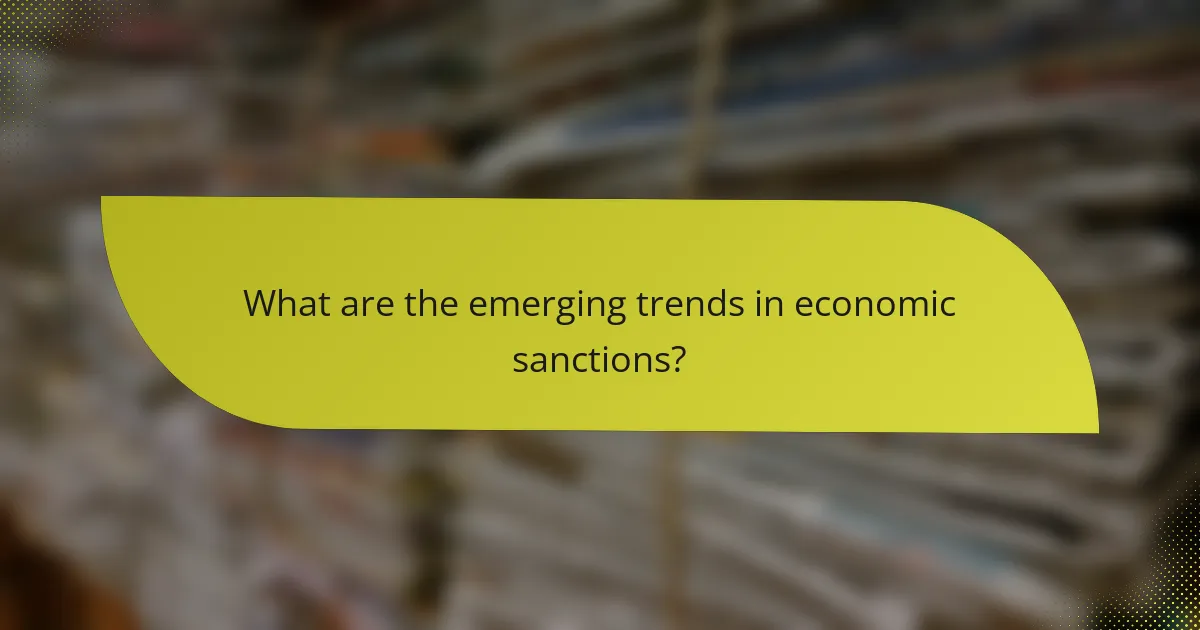
What are the emerging trends in economic sanctions?
Emerging trends in economic sanctions reflect a shift towards more targeted measures aimed at specific individuals or entities rather than entire nations. This approach seeks to minimize collateral damage on civilian populations while still exerting pressure on governments or organizations to change their behavior.
Targeted sanctions vs. comprehensive sanctions
Targeted sanctions focus on specific individuals, companies, or sectors, allowing for precise economic pressure without broadly impacting the general population. Common forms include asset freezes, travel bans, and restrictions on financial transactions for designated persons or organizations.
In contrast, comprehensive sanctions apply to entire countries, restricting trade, investment, and financial exchanges. These measures can lead to significant economic hardship for the general populace, often resulting in humanitarian crises. For instance, comprehensive sanctions against North Korea have severely limited its access to international markets.
When considering which type of sanction to implement, policymakers must weigh the intended goals against potential humanitarian impacts. Targeted sanctions can be more effective in achieving specific objectives while minimizing unintended consequences, but they require robust enforcement mechanisms to ensure compliance.
